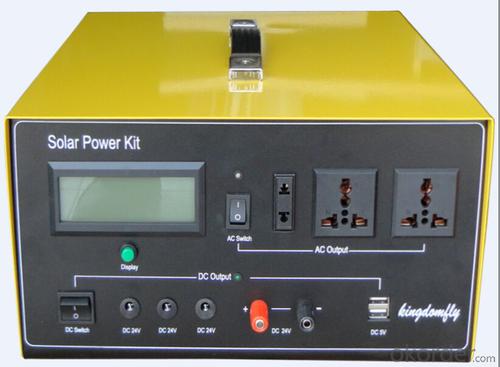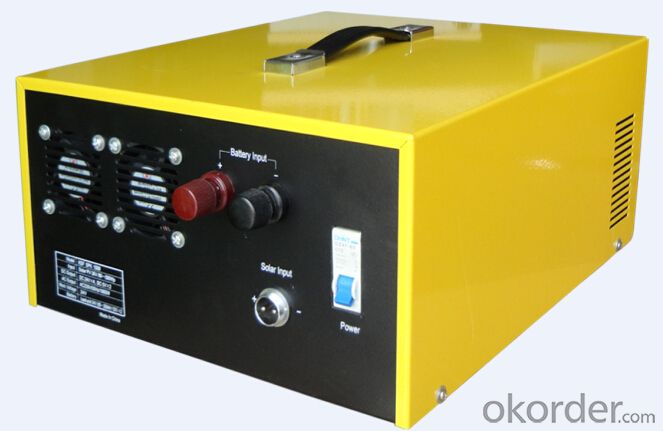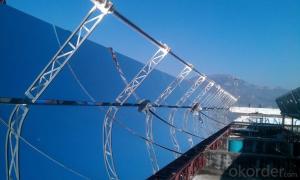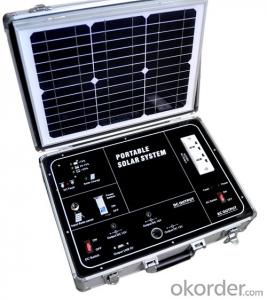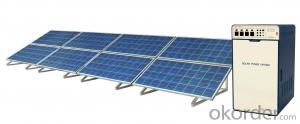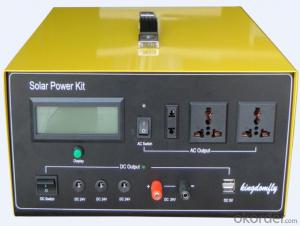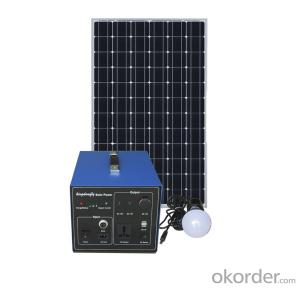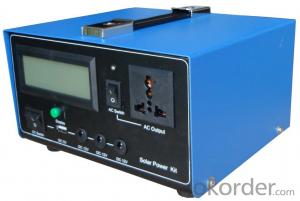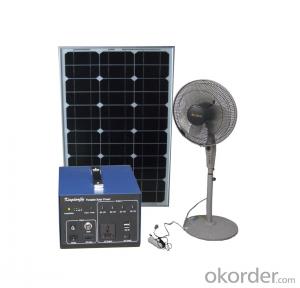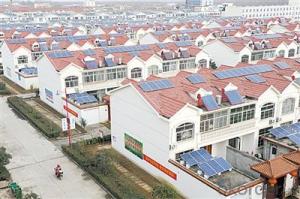Residential Solar Energy Systems - Household Solar Power Kit Hot Selling SPK_P1000
- Loading Port:
- China main port
- Payment Terms:
- TT OR LC
- Min Order Qty:
- 3 pc
- Supply Capability:
- 10000 pc/month
OKorder Service Pledge
OKorder Financial Service
You Might Also Like
Main Information
KDF SPK_P1000 This product is high performance,family used portable solar power system,which can receive energy and store it in battery outside connected to SPK by solar energy on sunny day,and supplies electric power for varies appliances such as electric fan,lighting lamps, television, portable computer etc.It can supply power for both DC and AC electric application .It’s very helpful and useful for home electric supply.
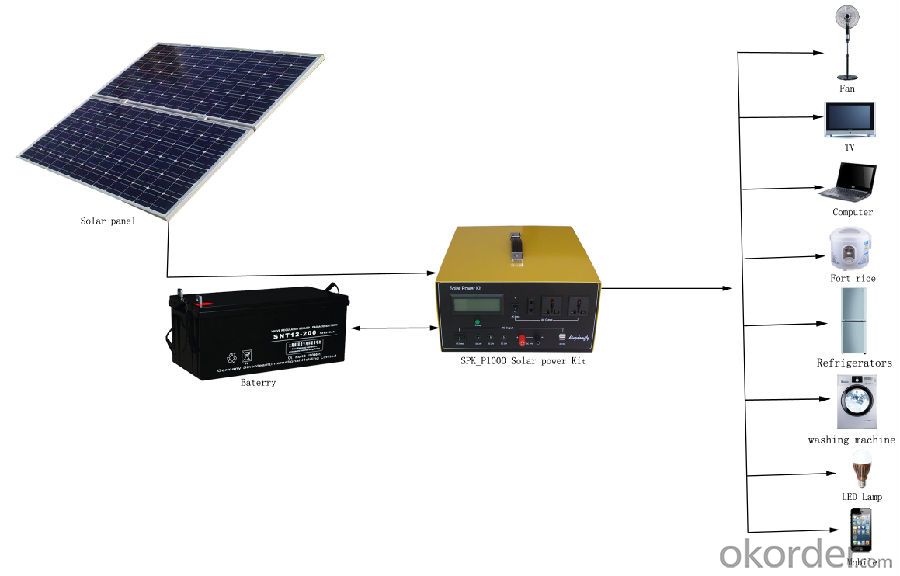
Features:
◆ Battery puts outside connected to the SPK for user to choose battery in recommended range, and easily to exchange battery.
◆ Both DC and AC output
◆ Solar Feedback Circuit Protection
◆ Output Short-circuit Protection
◆ Solar「+」「-」anti-access protection
◆ Output「+」「-」anti-access protection
◆ Over Charged Protection
◆ Over Discharged Protection
◆ Over Load Protection
◆ Over-Temperature Protection
Technical parameters
Specification | Value/Material | |
Item No. KDF | SPK_P1000 | |
Solar Recommended | Specification | Poly silicon |
Working Voltage/Power | 36V/80W~500W | |
Battery Recommended | Rated Voltage/Capacity | 24V50AH~200AH |
Cycle Number | 80% Deep Cycle Number:500 70% Cycle Number:800 | |
Working Temperature | Short Period(one Month):-20~50℃Long Period(Six Months):-10~45℃ | |
Charging Controller | Operating Voltage | 24V |
Input Voltage | 34.6V~42V | |
Input current | MAX:20A | |
Power Consumption | MAX: 15mA | |
Low Voltage Disconnect(LVD) | 21.6V | |
Low Voltage Reconnect(LVR) | 24.6V | |
High Voltage Discharge( HVC) | 29.2V | |
High Voltage Recharge(HVR) | 27.6V | |
Temperature Protection | 60℃ | |
DC Output | DC output & Application | USB 5V2A |
DC output & Application | DC 24V | |
AC Output | Output Wave | Pure sine wave |
Input Voltage | 22V~30V | |
Output Voltage | 220V±10% | |
Output Frequency | 60Hz±2Hz/50Hz±2Hz | |
Rated Output Power | 1000W | |
Maximum VA | 2000VA | |
Maximum Efficiency | 88% | |
Temperature | 0-40℃ | |
Over Temperature | 60℃~70℃ | |
Low Voltage Alarm | 22V | |
Low Voltage Shut off | 21V | |
High Voltage Shut off | 30V | |
Package | Set size | 350*449*227mm |
Set N·W | 7.2kg | |
Set N·W | 5.2kg | |
LCD_Display
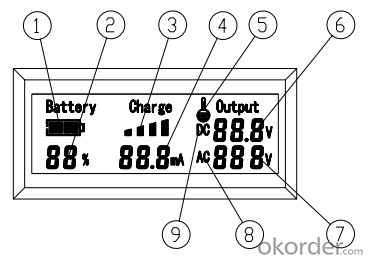
No. | Name | Function |
1 | Battery Icon | To show the Volume of the Battery |
2 | Date of % | To show the percent of the Battery |
3 | Charging Icon | To show the charging condition |
4 | Current | To show the value of charge current |
5 | Temperature Icon | Temperature Alarm |
6 | Date of Voltage | To Show the Value of DC output voltage |
7 | Date of Voltage | To Show the Value of AC output voltage |
8 | AC Icon | AC output |
9 | DC Icon | DC output |
- Q: Can solar energy systems be used for commercial buildings?
- Yes, solar energy systems can be used for commercial buildings. Many businesses are increasingly adopting solar energy as a viable and sustainable source of power. Commercial buildings can install solar panels on rooftops or in open spaces to generate electricity, reduce energy costs, and lower carbon emissions. Additionally, government incentives and tax credits have made it financially attractive for businesses to invest in solar energy systems.
- Q: How do solar energy systems impact energy efficiency measures?
- Solar energy systems have a positive impact on energy efficiency measures by reducing the overall energy consumption of a building or facility. By harnessing the power of the sun, solar panels generate clean and renewable electricity, which can offset the need for traditional energy sources. This not only lowers energy costs but also reduces greenhouse gas emissions. Furthermore, solar energy systems can integrate with energy-efficient technologies such as LED lighting or smart thermostats, maximizing the overall efficiency and sustainability of a building.
- Q: Can solar energy systems be financed?
- Yes, solar energy systems can be financed through various options such as loans, leases, power purchase agreements (PPAs), and government incentives. These financial options make it easier for homeowners, businesses, and organizations to invest in solar energy and benefit from long-term energy savings.
- Q: What is the difference between a solar energy system and a solar thermal system?
- A solar energy system refers to a broader term that encompasses both solar thermal systems and photovoltaic systems. Solar thermal systems specifically focus on converting sunlight into heat energy, which is then used for heating water or space. On the other hand, photovoltaic systems convert sunlight directly into electricity using solar panels.
- Q: Can solar energy systems be used for powering outdoor signage or billboards?
- Yes, solar energy systems can indeed be used to power outdoor signage or billboards. Solar panels can be installed on the rooftops, nearby poles, or on the billboard structure itself to harness sunlight and convert it into electricity. This renewable energy source provides a sustainable and cost-effective solution for powering outdoor advertising, reducing reliance on traditional grid electricity and minimizing environmental impact.
- Q: Can solar energy systems be used in powering banks or financial institutions?
- Yes, solar energy systems can certainly be used to power banks or financial institutions. Solar panels can be installed on the rooftops or premises of these establishments to generate electricity from sunlight. This renewable energy source can help reduce the reliance on traditional fossil fuel-based power, lower energy costs, and contribute to a greener and more sustainable operation for banks and financial institutions.
- Q: Can solar energy systems be used in areas with limited roof access for maintenance?
- Solar energy systems can indeed be utilized in areas where roof access for maintenance is limited. Although the usual practice is to install solar panels on rooftops for maximum exposure to sunlight, there are alternative choices to consider. One option is to install ground-mounted solar panels in areas where roof access is restricted, making maintenance and cleaning tasks simpler. Furthermore, solar panel systems can be integrated into other structures like carports or pergolas, offering an alternative approach to the conventional rooftop installations. These alternatives guarantee the effective utilization of solar energy systems in areas with limited roof access for maintenance.
- Q: Can solar energy systems be used for commercial or industrial purposes?
- Yes, solar energy systems can be used for commercial or industrial purposes. Many businesses and industries are adopting solar energy systems to meet their energy needs and reduce their reliance on traditional fossil fuel sources. Solar power is a cost-effective and sustainable option for powering commercial buildings, factories, warehouses, and other industrial facilities. It helps businesses save on energy costs, reduce carbon emissions, and demonstrate their commitment to environmental sustainability.
- Q: Can solar energy systems be used in powering water pumps?
- Solar energy systems have the capability to power water pumps. In fact, there is a growing trend and widespread use of solar-powered water pumps. Solar energy systems consist of solar panels that convert sunlight into electricity. This electricity can then be utilized to operate various appliances and devices, including water pumps. These pumps serve multiple purposes, such as irrigation, livestock watering, and even residential or commercial water supply systems. Different types of solar-powered water pumps are available, including submersible pumps, surface pumps, and floating pumps. This variety allows for flexibility in meeting diverse water pumping needs. The use of solar energy to power water pumps not only benefits the environment by reducing reliance on fossil fuels but also offers an economically viable and sustainable solution, particularly in remote areas where access to electricity may be limited.
- Q: Can solar energy systems be used for powering off-grid eco-cities?
- Yes, solar energy systems can be used for powering off-grid eco-cities. Solar panels can be installed in these eco-cities to harness the sun's energy and convert it into electricity. This renewable energy source can then be used to power various needs within the city, such as lighting, heating, and even charging electric vehicles. By relying on solar energy, off-grid eco-cities can reduce their carbon footprint and promote sustainable living.
Send your message to us
Residential Solar Energy Systems - Household Solar Power Kit Hot Selling SPK_P1000
- Loading Port:
- China main port
- Payment Terms:
- TT OR LC
- Min Order Qty:
- 3 pc
- Supply Capability:
- 10000 pc/month
OKorder Service Pledge
OKorder Financial Service
Similar products
Hot products
Hot Searches
Related keywords



